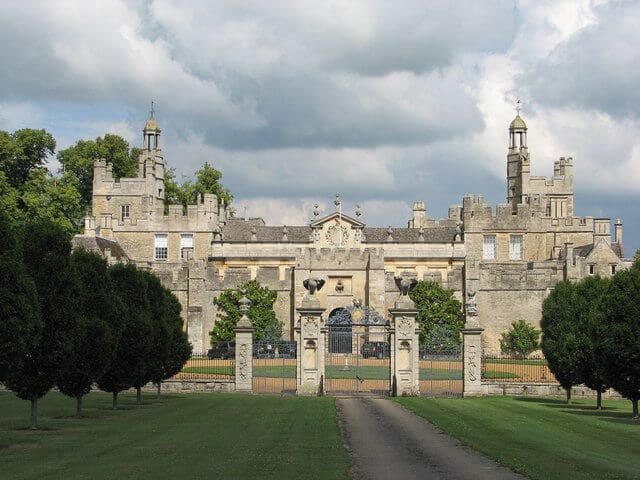The real cost of Oliver Quick inheriting Saltburn fortune

John Sutton / Drayton House: south-east front
Image sourced from Wikipedia
Watched by millions and grossing over $20 million worldwide, it’s no secret that Saltburn was the must-see film at the end of 2023.
Fans have watched in awe and disgust as the plot sees the main protagonist, Oliver Quick, go from an unpopular Oxford University scholarship student to a close friend and confidant of the Cattons and eventual heir to the family’s fortune and country house – Saltburn.
Oliver is seemingly above suspicion throughout the film, but at the end, it’s revealed that he orchestrated all the tragic events that happened at Saltburn in the summer of 2007 and played the long game to reunite with Elspeth, and somehow convince her to sign over all her assets so that he would inherit the estate himself.
While this may seem possible, here are some issues we’ve identified that make Oli’s grand master plan less realistic…
1. The hidden costs of inheritance could see him lose out on millions
We might see the former student pop the bubbly and dance around the house naked in celebration, but when inheriting a large fortune like the Catton’s, he’d likely run into a few big bills initially.
Inheritance tax is applied to estates worth over £325,000, and as Oliver isn’t Elspeth’s spouse or civil partner, he will be required to pay 40 percent of the property’s remaining value. Saltburn (aka Drayton House) is a Grade I listed building with 127 rooms. While its value isn’t fully known, a current listing from Zoopla shows a 6-bedroom mansion in South West London valued at £15 million, so we’d expect the cost and, subsequently, the inheritance tax fees to be high.
Not to mention that he’d also have to pay out for legal and probate fees. Although Saltburn is full of valuable items that he could sell to get the funds, it’s worth noting that Oliver wouldn’t be able to access those until after the probate process was complete, so hopefully, he was smart and has some of that bribe money left to pay for all these hidden costs.
2. Delays and disputes mean Saltburn might not officially be his for a while
While it is unknown how much preparation Oliver did before Elspeth died, we have to assume he tricked her into signing over her estate and fortune, making him the executor and beneficiary.
Oliver’s permanent residency at Saltburn seems pretty quick once she passes away, but the reality is that the house might not officially be his until probate is complete.
The average wait for a grant currently stands at 14 weeks, with 90 percent of the UK’s empty homes estimated to be a result of the long probate process. This can be longer if the estate matters are complex, for example, if Oliver is missing documentation (will, death certificate, financial statements), or if the will is contested by wider family members, perhaps on the grounds that his relationship with Elspeth is tenuous (or non-existent) between 2006-2022.
To make his Saltburn dream a reality, the unlikely heir best have put enough money away in case he needs to fund additional living arrangements and his luxury lifestyle while awaiting property ownership transfer and dealing with conflicts.
3. It would be very difficult and expensive to insure
The Saltburn house, which is actually Drayton House in Lowick, Northamptonshire, is Grade I listed and would be difficult to insure, even for a specialist home insurer like us.
That’s because it would have an extremely high rebuild cost and would likely cost tens of millions of pounds to rebuild to the same specification.
Without insurance, Oliver’s future home is susceptible to millions in unpaid damages should anything happen to its structure or contents.
While Saltburn would be very difficult to insure, we insure a range of other unusual properties and situations, including those which may struggle to secure policies with traditional providers such as houses built before 1850, listed buildings, unoccupied homes, people living with non-family members and whose houses contain high-value items.
Get a quote here.





